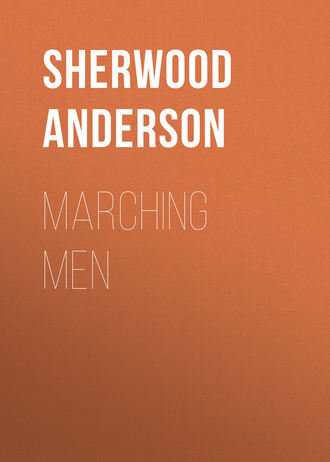 полная версия
полная версияMarching Men
McGregor jumped upon the platform and walked in at the warehouse door. The German followed, inventorying the size of the red-haired giant with something like disapproval. His look seemed to say, “I like strong fellows but you’re too strong.” He took the discomfiture of the two feeble workmen on the sidewalk as in some way reflecting upon himself. The two men stood in the receiving room and looked at each other. A bystander might have thought them preparing to fight.
And then a freight elevator came slowly down from the upper part of the warehouse and from it jumped a small grey-haired man with a yard stick in his hand. He had a sharp restless eye and a short stubby grey beard. Striking the floor with a bound he began to talk. “We pay two dollars for nine hours’ work here—begin at seven, quit at five. Will you come?” Without waiting for an answer he turned to the German. “Tell those two old ‘rummies’ to get their time and get out of here,” he said, turning again and looking expectantly at McGregor.
McGregor liked the quick little man and grinned with approval of his decisiveness. He nodded his assent to the proposal and, looking at the German, laughed. The little man disappeared through a door leading to an office and McGregor walked out into the street. At a corner he turned and saw the German standing on the platform before the warehouse looking after him. “He is wondering whether or not he can whip me,” thought McGregor.
In the apple warehouse McGregor worked for three years, rising during his second year to be foreman and replacing the tall German. The German expected trouble with McGregor and was determined to make short work of him. He had been offended by the action of the gray-haired superintendent in hiring the man and felt that a prerogative belonging to himself had been ignored. All day he followed McGregor with his eyes, trying to calculate the strength and courage in the huge body. He knew that hundreds of hungry men walked the streets and in the end decided that the need of work if not the spirit of the man would make him submissive. During the second week he put the question that burned in his brain to the test. He followed McGregor into a dimly-lighted upper room where barrels of apples, piled to the ceiling, left only narrow ways for passage. Standing in the semi-darkness he shouted, calling the man who worked among the apple barrels a foul name, “I won’t have you loafing in there, you red-haired bastard,” he shouted.
McGregor said nothing. He was not offended by the vileness of the name the German had called him and took it merely as a challenge that he had been expecting and that he meant to accept. With a grim smile on his lips he walked toward the German and when but one apple barrel lay between them reached across and dragged the foreman sputtering and swearing down the passageway to a window at the end of the room. By the window he stopped and putting his hand to the throat of the struggling man began to choke him into submission. Blows fell on his face and body. Struggling terribly the German kicked McGregor’s legs with desperate energy. Although his ears rang with the hammer-like blows that fell about his neck and cheeks McGregor stool silent under the storm. His blue eyes gleamed with hatred and the muscles of his great arms danced in the light from the window. As he looked into the protruding eyes of the writhing German he thought of fat Reverend Minot Weeks of Coal Creek and added an extra twitch to the flesh between his fingers. When a gesture of submission came from the man against the wall he stepped back and let go his grip. The German dropped to the floor. Standing over him McGregor delivered his ultimatum. “You report this or try to get me fired and I’ll kill you outright,” he said. “I’m going to stay here on this job until I get ready to leave it. You can tell me what to do and how to do it but when you speak to me again say ‘McGregor’—Mr. McGregor, that’s my name.”
The German got to his feet and began walking down the passageway between the rows of piled barrels. As he went he helped himself along with his hands. McGregor went back to work. After the retreating form of the German he shouted, “Get a new place when you can Dutch, I’ll be taking this job away from you when I’m ready for it.”
That evening as McGregor walked to the car he saw the little grey-haired superintendent standing waiting for him before a saloon. The man made a sign and McGregor walked across and stood beside him. They went together into the saloon and stood leaning against the bar and looked at each other. A smile played about the lips of the little man. “What have you been doing to Frank?” he asked.
McGregor turned to the bartender who stood waiting before him. He thought that the superintendent intended to try to patronise him by buying him a drink and he did not like the thought. “What will you have? I’ll take a cigar for mine,” he said quickly, defeating the superintendent’s plan by being the first to speak. When the bartender brought the cigars McGregor paid for them and walked out at the door. He felt like one playing a game. “If Frank meant to bully me into submission this man also means something.”
On the sidewalk before the saloon McGregor stopped. “Look here,” he said, turning and facing the superintendent, “I’m after Frank’s place. I’m going to learn the business as fast as I can. I won’t put it up to you to fire him. When I get ready for the place he won’t be there.”
A light flashed into the eyes of the little man. He held the cigar McGregor had paid for as though about to throw it into the street. “How far do you think you can go with your big fists?” he asked, his voice rising.
McGregor smiled. He thought he had earned another victory and lighting his cigar held the burning match before the little man. “Brains are intended to help fists,” he said, “I’ve got both.”
The superintendent looked at the burning match and at the cigar between his fingers. “If I don’t which will you use on me?” he asked.
McGregor threw the match into the street. “Aw! don’t bother asking,” he said, holding out another match.
McGregor and the superintendent walked along the street. “I would like to fire you but I won’t. Some day you’ll run that warehouse like a clock,” said the superintendent.
McGregor sat in the street-car and thought of his day. It had been he felt a day of two battles. First the direct brutal battle of fists in the passageway and then this other battle with the superintendent. He thought he had won both fights. Of the fight with the tall German he thought little. He had expected to win that. The other was different. The superintendent he felt had wanted to patronise him, patting him on the back and buying him drinks. Instead he had patronised the superintendent. A battle had gone on in the brains of the two men and he had won. He had met a new kind of man, one who did not live by the raw strength of his muscles and he had given a good account of himself. The conviction that he had, besides a good pair of fists, a good brain swept in on him glorifying him. He thought of the sentence, “Brains are intended to help fists,” and wondered how he had happened to think of it.
CHAPTER II
The street in which McGregor lived in Chicago was called Wycliff Place, after a family of that name that had once owned the land thereabout. The street was complete in its hideousness. Nothing more unlovely could be imagined. Given a free hand an indiscriminate lot of badly trained carpenters and bricklayers had builded houses beside the cobblestone road that touched the fantastic in their unsightliness and inconvenience.
The great west side of Chicago has hundreds of such streets and the coal mining town out of which McGregor had come was more inspiring as a place in which to live. As an unemployed young man, not much given to chance companionships, Beaut had spent many long evenings wandering alone on the hillsides above his home town. There was a kind of dreadful loveliness about the place at night. The long black valley with its dense shroud of smoke that rose and fell and formed itself into fantastic shapes in the moonlight, the poor little houses clinging to the hillside, the occasional cry of a woman being beaten by a drunken husband, the glare of the coke fires and the rumble of coal cars being pushed along the railroad tracks, all of these made a grim and rather inspiring impression on the young man’s mind so that although he hated the mines and the miners he sometimes paused in his night wanderings and stood with his great shoulders lifted, breathing deeply and feeling things he had no words in him to express.
In Wycliff Place McGregor got no such reactions. Foul dust filled the air. All day the street rumbled and roared under the wheels of trucks and light hurrying delivery wagons. Soot from the factory chimneys was caught up by the wind and having been mixed with powdered horse manure from the roadway flew into the eyes and the nostrils of pedestrians. Always a babble of voices went on. At a corner saloon teamsters stopped to have their drinking cans filled with beer and stood about swearing and shouting. In the evening women and children went back and forth from their houses carrying beer in pitchers from the same saloon. Dogs howled and fought, drunken men reeled along the sidewalk and the women of the town appeared in their cheap finery and paraded before the idlers about the saloon door.
The woman who rented the room to McGregor boasted to him of Wycliff blood. It was that she told him that had brought her to Chicago from her home at Cairo, Illinois. “The place was left to me and not knowing what else to do with it I came here to live,” she said. She explained to him that the Wycliffs had been people of note in the early history of Chicago. The huge old house with the cracked stone steps and the ROOMS TO RENT sign in the window had once been their family seat.
The history of this woman was characteristic of the miss-fire quality of much of American life. She was at bottom a wholesome creature who should have lived in a neat frame house in a village and tended a garden. On Sunday she should have dressed herself with care and gone off to sit in a country church with her hands crossed and her soul at rest.
The thought of owning a house in the city had however paralysed her brain. The house itself was worth a certain number of thousands of dollars and her mind could not rise above that fact, so her good broad face had become grimy with city dirt and her body weary from the endless toil of caring for roomers. On summer evenings she sat on the steps before her house clad in some bit of Wycliff finery taken from a trunk in the attic and when a lodger came out at the door she looked at him wistfully and said, “On such a night as this you could hear the whistles on the river steamers in Cairo.”
McGregor lived in a small room at the end of a tall on the second floor of the Wycliff house. The windows of the room looked down into a dirty little court almost surrounded by brick warehouses. The room was furnished with a bed, a chair that was always threatening to come to pieces and a desk with weak carved legs.
In this room sat McGregor night after night striving to realise his Coal Creek dream of training his mind and making himself of some account in the world. From seven-thirty until nine-thirty he sat at a desk in a night school. From ten until midnight he read in his room. He did not think of his surroundings, of the vast disorder of life about him, but tried with all his strength to bring something like order and purpose into his own mind and his own life.
In the little court under the window lay heaps of discarded newspaper tossed about by the wind. There in the heart of the city, walled in by the brick warehouse and half concealed under piles of chair legs cans and broken bottles, lay two logs in their time no doubt, a part of the grove that once lay about the house. The neighbourhood had passed so rapidly from country estate to homes and from homes to rented lodgings and huge brick warehouses that the marks of the lumberman’s axe still showed in the butts of the logs.
McGregor seldom saw the little court except when its ugliness was refined and glossed over by darkness or by the moonlight. On hot evenings he laid down his book and leaning far out of the window rubbed his eyes and watched the discarded newspapers, worried by the whirlpools of wind in the court, run here and there, dashing against the warehouse walls and vainly trying to escape over the roof. The sight fascinated him and brought a thought into his mind. He began to think that the lives of most of the people about him were much like the dirty newspaper harried by adverse winds and surrounded by ugly walls of facts. The thought drove him from the window to renewed effort among his books. “I’ll do something here anyway. I’ll show them,” he growled.
One living in the house with McGregor during those first years in the city might have thought his life stupid and commonplace but to him it did not seem so. It was for the miner’s son a time of sudden and tremendous growth. Filled with confidence in the strength and quickness of his body he was beginning to have also confidence in the vigour and clearness of his brain. In the warehouse he went about with eyes and ears open, devising in his mind new methods of moving goods, watching the men at work, marking the shirkers, preparing to pounce upon the tall German’s place as foreman.
The superintendent of the warehouse, not understanding the turn of the talk with McGregor on the sidewalk before the saloon, decided to like him and laughed when they met in the warehouse. The tall German maintained a policy of sullen silence and went to laborious lengths to avoid addressing him.
In his room at night McGregor began to read law, reading each page over and over and thinking of what he had read through the next day as he rolled and piled apple barrels in the passages in the warehouse.
McGregor had an aptitude and an appetite for facts. He read law as another and gentler nature might have read poetry or old legends. What he read at night he remembered and thought about during the day. He had no dream of the glories of the law. The fact that these rules laid down by men to govern their social organisation were the result of ages of striving toward perfection did not greatly interest him and he only thought of them as weapons with which to attack and defend in the battle of brains he meant presently to fight. His mind gloated in anticipation of the battle.
CHAPTER III
And then a new element asserted itself in the life of McGregor. One of the hundreds of disintegrating forces that attack strong natures, striving to scatter their force in the back currents of life, attacked him. His big body began to feel with enervating persistency the call of sex.
In the house in Wycliff Place McGregor passed as a mystery. By keeping silence he won a reputation for wisdom. The clerks in the hall bedrooms thought him a scientist. The woman from Cairo thought him a theological student. Down the hall a pretty girl with large black eyes who worked in a department store down town dreamed of him at night. When in the evening he banged the door to his room and strode down the hallway going to the night school she sat in a chair by the open door of her room. As he passed she raised her eyes and looked at him boldly. When he returned she was again by the door and again she looked boldly at him.
In his room, after the meetings with the black-eyed girl McGregor found difficulty in keeping his mind on the reading. He felt as he had felt with the pale girl on the hillside beyond Coal Creek. With her as with the pale girl he felt the need of defending himself. He began to make it a practice to hurry along past her door.
The girl in the hall bedroom thought constantly of McGregor. When he had gone to night school another young man of the house who wore a Panama hat came from the floor above and, putting his hands on the door frames of her room, stood looking at her and talking. In his lips he held a cigarette, which when he talked hung limply from the corner of his mouth.
This young man and the black-eyed girl kept up a continuous stream of comments on the doings of red-haired McGregor. Begun by the young man, who hated him because of his silence, the subject was kept alive by the girl who wanted to talk of McGregor.
On Saturday nights the young man and the girl sometimes went together to the theatre. One night in the summer when they had returned to the front of the house the girl stopped. “Let’s see what the big red-head is doing,” she said.
Going around the block they stole in the darkness down an alleyway and stood in the little dirty court looking up at McGregor who, with his feet in the window and a lamp burning at his shoulder, sat in his room reading.
When they returned to the front of the house the black-eyed girl kissed the young man, closing her eyes and thinking of McGregor. In her room later she lay abed dreaming. She imagined herself assaulted by the young man who had crept into her room and that McGregor had come roaring down the hall to snatch him away and fling him outside the door.
At the end of the hallway near the stairway leading to the street lived a barber. He had deserted a wife and four children in a town in Ohio and to prevent recognition had grown a black beard. Between this man and McGregor a companionship had sprung up and they went together on Sunday mornings to walk in the park. The black bearded man called himself Frank Turner.
Frank Turner had a passion. Through the evenings and on Sunday afternoons he sat in his room making violins. He worked with a knife, glue, pieces of glass and sand paper and spent his earnings for ingredients for the making of varnishes. When he got hold of a piece of wood that seemed an answer to his prayers he took it to McGregor’s room and holding it up to the light talked of what he would do with it. Sometimes he brought a violin and sitting in the open window tested the quality of its tone. One evening he took an hour of McGregor’s time to talk of the varnish of Cremona and to read to him from a worn little book concerning the old Italian masters of violin making.
On a bench in the park sat Turner, the maker of violins, the man who dreamed of the rediscovery of the varnish of Cremona, talking to McGregor, son of the Pennsylvania miner.
It was a Sunday afternoon and the park was vibrant with life. All day the street cars had been unloading Chicagoans at the park entrance. They came in pairs and in parties, young men with their sweethearts and fathers with families at their heels. Now at the end of the day they continued to come, a steady stream of humanity flowing along the gravel walk past the bench where the two men sat in talk. Through the stream and crossing it went another stream homeward bound. Babies cried. Fathers called to the children at play on the grass. Cars coming to the park filled went away filled.
McGregor looked about him and thought of himself and of the restless moving people. In him there was none of that vague fear of the multitude common to many solitary souls. His contempt of men and of the lives lived by men reinforced his native boldness. The odd little rounding of the shoulders of even the athletic young men made him straighten with pride his own shoulders and fat and lean, tall and short, he thought of all men as counters in some vast games at which he was presently to be a master player.
The passion for form, that strange intuitive power that many men have felt and none but the masters of human life have understood, had begun to awaken in him. Already he had begun to sense out the fact that for him law was but an incident in some vast design and he was altogether untouched by the desire for getting on in the world, by the greedy little snatching at trifles that was the whole purpose of the lives of so many of the people about him. When somewhere in the park a band began to play he nodded his head up and down and ran his hand nervously up and down the legs of his trousers. Into his mind came the desire to boast to the barber, telling of the things he meant to do in the world, but he put the desire away. Instead he sat silently blinking his eyes and wondering at the persistent air of ineffectiveness in the people who passed. When a band went by playing march music and followed by some fifty men wearing white plumes in their hats and walking with self-conscious awkwardness, he was startled. Among the people he thought there was a change. Something like a running shadow passed over them. The babbling of voices ceased and like himself the people began to nod their heads. A thought, gigantic in its simplicity, began to come into his mind but was wiped out immediately by his impatience with the marchers. A madness to spring up and run among them knocking them about and making them march with the power that comes of abandonment almost lifted him from the bench. His mouth twitched and his fingers ached for action.
In and out among the trees and on the green spaces moved the people. Along the shores of a pond sat men and women eating the evening meal from baskets or from white cloths spread on the grass. They laughed and shouted at each other and at the children, calling them back from the gravel driveways filled with moving carriages. Beaut saw a girl throw an egg shell and hit a young fellow between the eyes, and then run laughing away along the shore of the pond. Under a tree a woman nursed a babe, covering her breasts with a shawl so that just the black head of the babe showed. Its tiny hand clutched at the mouth of the woman. In an open space in the shadow of a building young men played baseball, the shouts of the spectators rising above the murmur of the voices of people on the gravel walk.
A thought came into McGregor’s mind that he wanted to discuss with the older man. He was moved by the sight of women about and shook himself like one awakening from a dream. Then he began looking at the ground and kicking up the gravel with his foot. “Look here,” he said, turning to the barber, “what is a man to do about women, about getting what he wants from the women?”
The barber seemed to understand. “It has come to that then?” he asked and looked quickly up. He lighted a pipe and sat looking at the people. It was then he told McGregor of the wife and four children in the Ohio town, describing the little brick house and the garden and the coop for chickens at the back like one who lingers over a place dear to his fancy. Something old and weary was in his voice as he finished.
“It wasn’t a matter for me to decide,” he said. “I came away because I couldn’t do anything else. I’m not excusing myself, I’m just telling you. There was something messy and disorderly about it all, about my life with her and with them. I couldn’t stand it. I felt myself being submerged by something. I wanted to be orderly and to work, you see. I couldn’t let violin making alone. Lord, how I tried—tried bluffing myself about it—calling it a fad.”
The barber looked nervously at McGregor to reassure himself of his interest. “I owned a shop on the main street of our town. Back of it was a blacksmith shop. During the day I stood by the chair in my shop talking to men being shaved about the love of women and a man’s duty to his family. Summer afternoons I went and sat on a keg in the blacksmith shop and talked of the same thing with the smith but all that did me no good.
“When I let myself go I dreamed not of my duty to my family but of working undisturbed as I do now here in the city in my room in the evenings and on Sundays.”
A sharpness came into the voice of the speaker. He turned to McGregor and talked vigorously like one making a defence. “My woman was a good enough sort,” he said. “I suppose loving is an art like writing a book or drawing pictures or making violins. People try to do it and don’t succeed. In the end we threw the job up and just lived together like most people do. Our lives got mussy and meaningless. That’s how it was.
“Before she married me my wife had been a stenographer in a factory that made tin cans. She liked that work. She could make her fingers dance along the keys. When she read a book at home she didn’t think the writer amounted to much if he made mistakes about punctuation. Her boss was so proud of her that he would brag of her work to visitors and sometimes would go off fishing leaving the running of the business in her hands.






